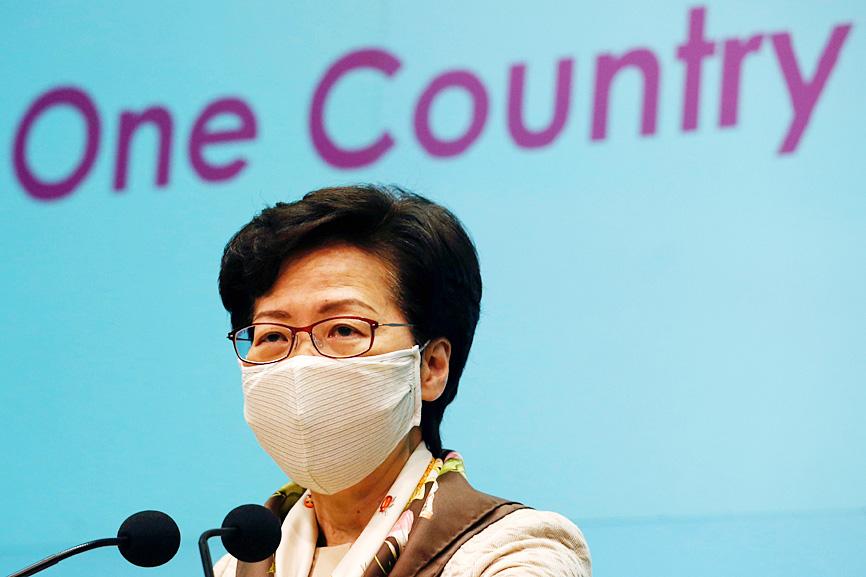Hong Kong Chief Executive Carrie Lam (林鄭月娥) said she has “piles of cash” at home as she has no bank account after the US slapped sanctions on her in response to a draconian security law China imposed on the territory.
Lam was targeted, along with 14 other senior city officials, in the toughest US action on Hong Kong since Beijing imposed Hong Kong’s National Security Law in late June.
The move by Washington freezes the US assets of the 15 officials and criminalizes any financial transactions in the US.

Photo: Reuters
In an interview with local English TV channel HKIBC aired on Friday night, Lam said she was “using cash every day for all the things” after being sanctioned.
“Sitting in front of you is a chief executive of the Hong Kong SAR [Special Administrative Region] who has no banking service made available to her,” Lam said.
“I have piles of cash at home, the government is paying me cash for my salary,” she added.
Lam added that it was “very honorable” to be “unjustifiably sanctioned” by the US government and does not want to deter anyone from serving in public office.
Earning HK$5.21 million (US$672,202) per year, Lam is one of the highest-paid leaders in the world.
Her remarks sparked a public backlash, with social media users posting photos of coins in their piggy banks at home to contrast with Lam’s wealth.
Others questioned how her large salary would be transported to her residence in cash.
Lam had told media in August that she faced “a little bit of inconvenience” from the sanctions which hampered her use of credit cards.
Nearly half of China’s major cities are suffering “moderate to severe” levels of subsidence, putting millions of people at risk of flooding, especially as sea levels rise, according to a study of nationwide satellite data released yesterday. The authors of the paper, published by the journal Science, found that 45 percent of China’s urban land was sinking faster than 3mm per year, with 16 percent at more than 10mm per year, driven not only by declining water tables, but also the sheer weight of the built environment. With China’s urban population already in excess of 900 million people, “even a small portion

UNSETTLING IMAGES: The scene took place in front of TV crews covering the Trump trial, with a CNN anchor calling it an ‘emotional and unbelievably disturbing moment’ A man who doused himself in an accelerant and set himself on fire outside the courthouse where former US president Donald Trump is on trial has died, police said yesterday. The New York City Police Department (NYPD) said the man was declared dead by staff at an area hospital. The man was in Collect Pond Park at about 1:30pm on Friday when he took out pamphlets espousing conspiracy theories, tossed them around, then doused himself in an accelerant and set himself on fire, officials and witnesses said. A large number of police officers were nearby when it happened. Some officers and bystanders rushed

HYPOCRISY? The Chinese Ministry of Foreign Affairs yesterday asked whether Biden was talking about China or the US when he used the word ‘xenophobic’ US President Joe Biden on Wednesday called for a hike in steel tariffs on China, accusing Beijing of cheating as he spoke at a campaign event in Pennsylvania. Biden accused China of xenophobia, too, in a speech to union members in Pittsburgh. “They’re not competing, they’re cheating. They’re cheating and we’ve seen the damage here in America,” Biden said. Chinese steel companies “don’t need to worry about making a profit because the Chinese government is subsidizing them so heavily,” he said. Biden said he had called for the US Trade Representative to triple the tariff rates for Chinese steel and aluminum if Beijing was

Beijing is continuing to commit genocide and crimes against humanity against Uyghurs and other Muslim minorities in its western Xinjiang province, U.S. Secretary of State Antony Blinken said in a report published on Monday, ahead of his planned visit to China this week. The State Department’s annual human rights report, which documents abuses recorded all over the world during the previous calendar year, repeated language from previous years on the treatment of Muslims in Xinjiang, but the publication raises the issue ahead of delicate talks, including on the war in Ukraine and global trade, between the top U.S. diplomat and Chinese